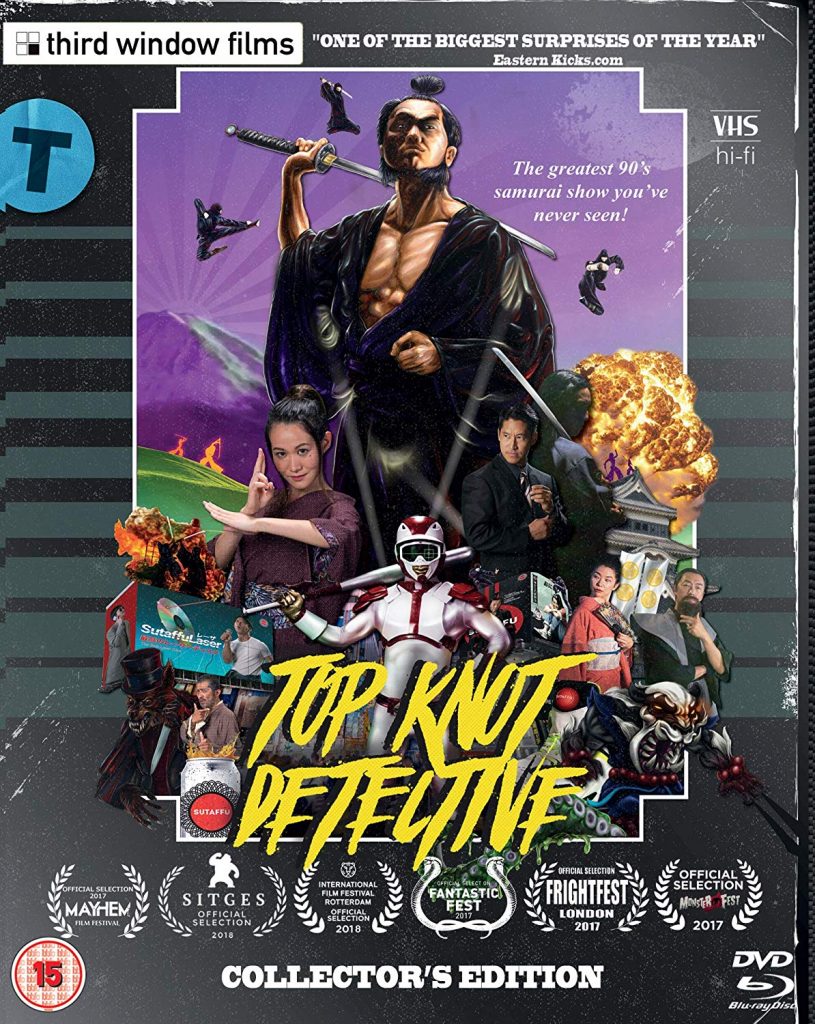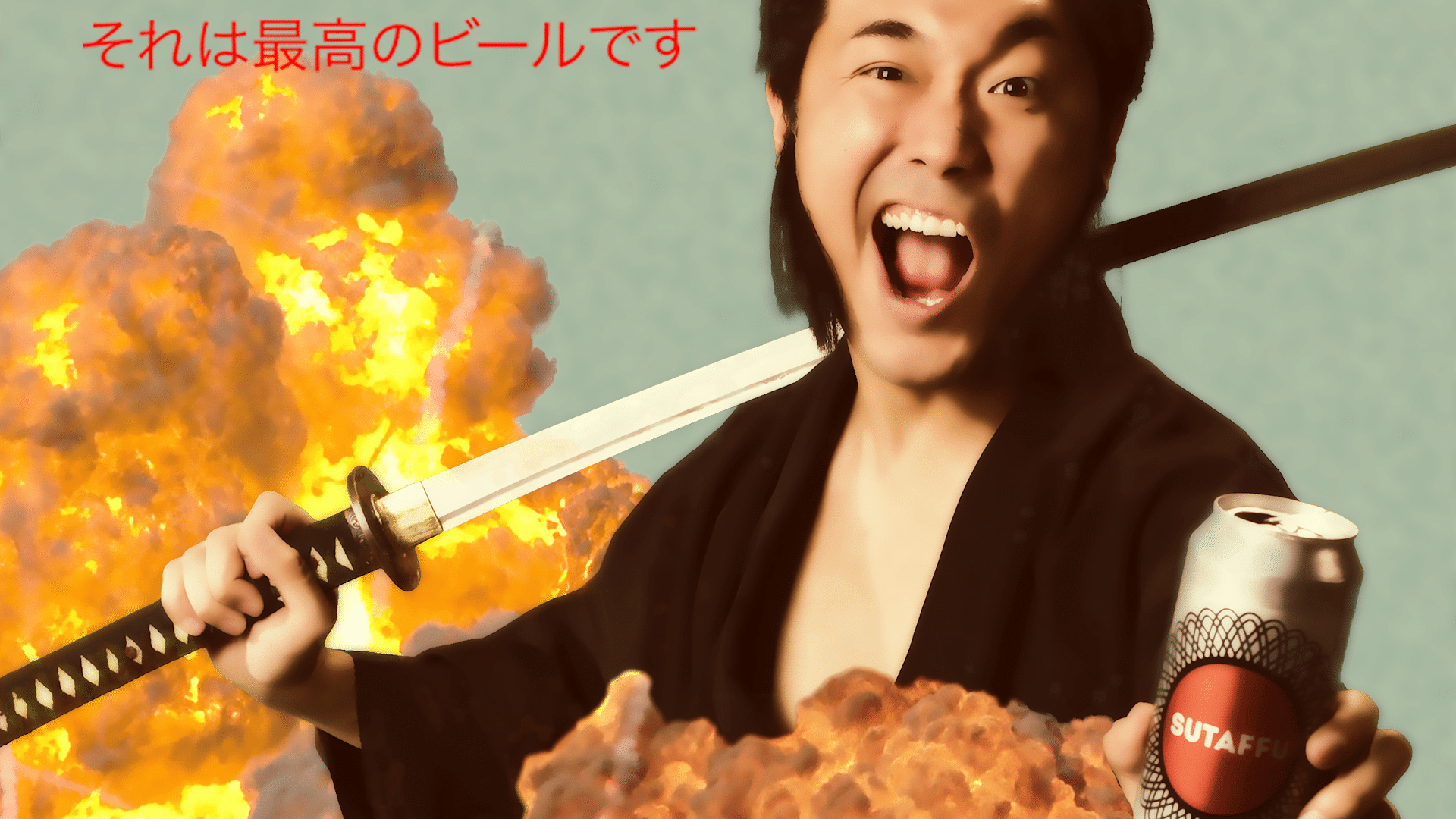
In recent years we’ve had no shortage of tongue-in-cheek exploitationers presenting themselves as lost movies from decades gone by, but Top Knot Detective takes this same jumping off point from a different angle. This Australian indie comedy from writer-director duo Aaron McCann and Dominic Pearce (making their feature debut here) posits itself not as rediscovered material, but as a documentary chronicling the rise and fall of a popular Japanese TV series from the early 1990s which mysteriously vanished from screens, only to resurface as a cult phenomenon via pirated VHS tapes. Those grindhouse/rewindhouse aesthetics are out in full force, with bad acting, blatant continuity errors, madcap tonal shifts and shoddy special effects aplenty; but by interspersing these scenes amidst talking head interviews and pseudo-archival footage, Top Knot Detective tells us a far richer and more personal story than we might anticipate, with an often surprisingly emotional edge. It’s all so detailed and multi-faceted that you’d be forgiven for thinking it was all for real – and, indeed, you may well find yourself half-wishing it actually was.
Toshi Okuzaki stars as Takashi Takamoto, a J-Pop star whose success sees him unexpectedly handed the reins to his own TV series when Sutaffu, the corporation responsible for his record career, decides to branch out into television. The show in question is Ronin Suiri Tantai, and as well as taking the lead role of Sheimasu Tantai – a police detective who goes rogue in search of his master’s murderer – Takashi also takes responsibility for the writing, directing and editing, and as a flagrant egomaniac he’s quick to take credit for plenty more besides. While the show proves a big hit, the battle for ratings and the demand for product placement sees the initially straight period drama shoehorn in all manner of ridiculous, incongruous plot devices, whilst the arrogance and increasingly erratic behaviour of the show’s figurehead leads to a great deal more drama behind the scenes.

Even when we put aside the self-conscious absurdity, there’s so much about Top Knot Detective that beggars belief. First, and perhaps most notably, it’s a true masterclass in production design and period detail. Going in blind, you honestly might think it was a bona fide documentary in a similar spirit to those of Mark Hartley, for not only do we have abundant footage from the lost TV series, we have clips from chat shows, news reports, music videos, commercials, paparazzi photos, tabloid headlines and more besides. While there’s certainly a – what’s the best word here – heightened quality to all this material, it’s presented in such a way that it could very easily pass for real, particularly given the wobbly VHS ageing effect; the extras reveal that the bulk of the film was shot digitally, but that much of this footage was in fact transferred onto VHS for editing. Plus, given that the story spans decades, with the cast and crew of the show appearing as interview subjects some 25 years later, the ageing make-up work is truly quite remarkable; the young folks swinging swords and laughing theatrically in the early days scenes really do look like the years have taken their toll in the contemporary-set moments.
The fact that McCann, Pearce and their team were able to achieve such verisimilitude on what is their first feature-length work is really quite staggering, to say nothing of how beautifully their direction and script captures a Japanese tone, despite them both being white westerners. Major props also due to Toshi Okuzaki, who, the extras also inform us, is by trade a teacher rather than a professional actor. His histrionic turn as the Top Knot Detective is the bedrock on which the whole enterprise is built; and, as was no doubt the intention, “deductive reasoning!” is destined to become a heavily quoted catchphrase. (It definitely helped sell it to me that one of my favourite bands in the world, Shonen Knife, deliver that line early on.) Yet we also can’t overlook the genuine pathos Okuzaki brings via his scenes as Takashi Takamoto; at once a contemptible figure, yet also clearly a product – and victim – of Japan’s corporate-controlled entertainment industry. On which note, Mayu Iwasaki gives us some of the most affecting moments in the film via the character arc of supporting star Mia Matsumoto. Top Knot Detective may be a heartfelt tribute to Japanese pop culture, but it doesn’t ignore the dark underbelly of that industry.
When all’s said and done, though, you’re unlikely to take too much enjoyment from Top Knot Detective unless you have an appreciation for ludicrous over-acting, unnecessary zooms, graphic violence utilising unconvincing prosthetics, gratuitous go-go dancing and karaoke, giant robots and monsters, plinky-plonky synth pop, and other such audiovisual treats so beloved of retro cult aficionados these days. Of course, if absolutely none of that sounds like fun to you… then, well, I don’t really know what I can say. Everyone else, go check out Top Knot Detective, and I can pretty much guarantee you a good time.
Top Knot Detective is available on region free dual format DVD & Blu-ray on 18th March, from Third Window Films.
